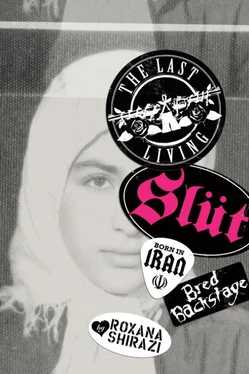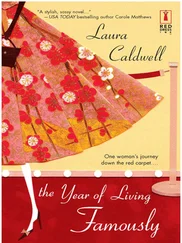In many ways, my mother was the opposite of my grandmother. Even though she was only in her mid-twenties, she was serious, quiet, and pensive—and an active revolutionary. She’d rush home from work and demonstrations to do chores, pay bills, find doctors, and fix the home.
“Don’t forget the duck-shaped bread,” I would yell after her as she left the house. She never did forget to bring back a piece of duck-shaped brioche. I remember waiting for that bread with uncontrollable joy rushing through my body.
My mother shunned makeup and fancy clothes, embracing simplicity and somber colors as a revolutionary stance. The only beauty routines she adored were ironing her hair fire-poker straight with the household iron and waxing her legs to gleaming marble smoothness with homemade wax.
“Here, help me rip these sheets, my darling,” she said one afternoon, looking up from the fraying garments strewn around her on the floor, gooey, yellow, hot wax on her leg and spatula in hand. Rip, rip, rip , went the old sheets to become strips for her legs. I watched my mother squeal in pain for the sake of beauty as she applied and then ripped the cotton strips away.
“I wanna do it!” I whined. I wanted to be glamorous, too.
“Not until you’re twenty,” my mother snapped, tending to her slim white legs. She wanted me to be a child, not to rush into womanhood. But by the age of five I already loved makeup. I was obsessed with dressing up in the latest fashions, and desperately wanted platform shoes and flared trousers.
I screamed and howled, driving my poor mother to tears. As far as I was concerned, it was detrimental to my existence to be denied a pair of platform shoes. And my mother went mad if I touched makeup, so when she was off at work and my grandmother had her afternoon siesta, I would sneak into my grandmother’s makeup bag and cream on her neon-pink lipstick and chalk on nightclub-blue eye shadow.
We hardly had any money, but I was a spoiled princess. Everyone in my family doted on me, especially my grandmother, who bought me so many dolls that they overtook the living room and made for quite a lively tea party. Still, I stamped my feet and cried through my whistling snotty nose because it wasn’t enough. I wanted her to buy me a bride doll that I’d seen in a shop window.
Even then, I always wanted more than I had.
Every morning, after my mother left for work, my grandmother and I began our day. First I’d run to the neighborhood bakery to get nooneh sangak —a foot-long triangular bread the man would bake while I watched. They would throw a slab of dough into the clay oven. It was still steaming when they brought it out, with tiny stones from the oven clinging to its underside. As they folded it, they would tell me to watch my fingers, but I didn’t care; I let the hot bread sting my mouth as I gobbled it down while running back to the house.
When I got home, we’d have breakfast sitting around the sofreh —an oil cloth spread on the floor for serving food—or sit by the fishpond in the garden. On the sofreh, feta cheese, herbs, fresh double cream, honey, and sour cherry jam were laid out with the hot tea. My grandmother brewed tea in the samovar , an hourglass-shaped decorative metal container that boiled water as steam escaped from its head, allowing the tea to brew slowly.
After the dawn prayer, an old, toothless lady by the name of Masha Baiim would come by most mornings to help my grandmother around the house. Her face was a brown, weathered map etched with deep lines. She had the patience of a saint and long black hair, which she wore in two braids hanging by her waist like rope. I was generally horrible to her, giving her hell and the occasional bite on the arm when she wouldn’t let me do the things I wanted to do.
After breakfast, I would go out to play with my friends in the alley. All the neighbors in the little houses knew one another. Our mud alley was always sunny and orange. Then we would roam the maidoon —or square—in the center of the neighborhood. In Tehran, every square had a number and was the social hub of the surrounding area.
By the time the sound of noon prayer wailed from the nearby mosque, the neighborhood buzzed with activity. The first to arrive was the salt seller, an old man who hobbled through the alley croaking “ Namaki! Namaki! ” (“Salt seller! Salt seller!”) and selling the raw rock salt he carried in a sack on his bent back. A few women would bring out scraps of dried bread, leftover food, or sometimes unwanted clothes to exchange for a piece of rock salt. I remember feeling lucky that I wasn’t as poor as the salt seller, whose skinny face would break into a humble, toothless grin as he collected the goods and sauntered off to the next street.
We played until the traders arrived at noon with their cartfuls of merchandise. In the winter, the beetroot seller wheeled his cart to a stop at the top of the alley. I would run to get coins from my grandmother. Peeling off the dirty outer layer of the cooked beet would expose the steaming hot flesh beneath. My teeth sliced through the chunks and I let the hot juice wash over my gums. The tamarind man was there year-round, selling us lovely sour-salty tamarind. In the spring came a man with gojeh sabz —small unripe sour green plums—which we would sprinkle with salt and eat until our stomachs ached.
Sometimes, in the middle of a hopscotch game, the cinema-rama man would appear. He’d wheel in a big box. We’d put coins in, look in a peephole, and be transported to another world. A world of corseted ladies with pink boas, fancy lace, and exotic hairbrushes. When the time ran out, we’d beg the adults for more money so we could exist just a little longer in Shahreh Farang (foreign city). I’d peer into it so deeply that my left eye would be bruised. And then my coins would run out.
“You can’t have money for this and the wheel!” my mother or grandmother would say, looking up from their work cleaning fresh herbs for dinner. I loved the mini Ferris wheel that rolled into the alley once or twice a week. It always drew a massive crowd, even though the top of the wheel rose only ten feet off the ground. It felt grand to sit in those old moldy seats in the sky.
Throughout the day, the sound of mournful prayer from the loudspeaker of a nearby mosque served as a fearful reminder to pray to God. In our home, my grandmother would promptly put on her chador and turn to face Mecca, the holy city. A deep and respectful silence would fall over the neighborhood as the grownups gathered their prayer mats and Mohr —a small chunk of holy clay that supposedly came directly from Mecca.
Some days, during the siesta that followed, I played alone in my grandmother’s garden. I felt like a princess there: the garden was my court, the fruit trees ready to serve me. A pomegranate tree, which opened her baby pink flowers in summer, showed the world she was ready to bear autumn fruit. Next to it stood a sour cherry tree—my favorite. Lifting the hem of my dress, I would pluck the tiny cherries and gather them in my skirts. I was greedy for that fruit, even more than the blackbirds who competed with me to fill their bellies first.
At the end of the garden wall rose the tallest fir tree I had ever seen. Its trunk was so wide and its branches so dense with pines that it provided a shield for me and my cousins’ childhood games.
On the left side of the garden were the roses—pink, yellow, and white. Puffy roses. Scarlet buds pursing their lips to the sky in a kiss. Right in the middle of the yard was a small round pond filled with goldfish and green slimy moss. Often I would undress and float naked under the water, holding my breath as long as I could to feel the slither of the fish and slippery moss against my chest and tummy. My cinnamon ringlets were soaked but, soon enough, the crisp Persian sun would toast them dry as I sunbathed naked on the concrete.
Читать дальше












